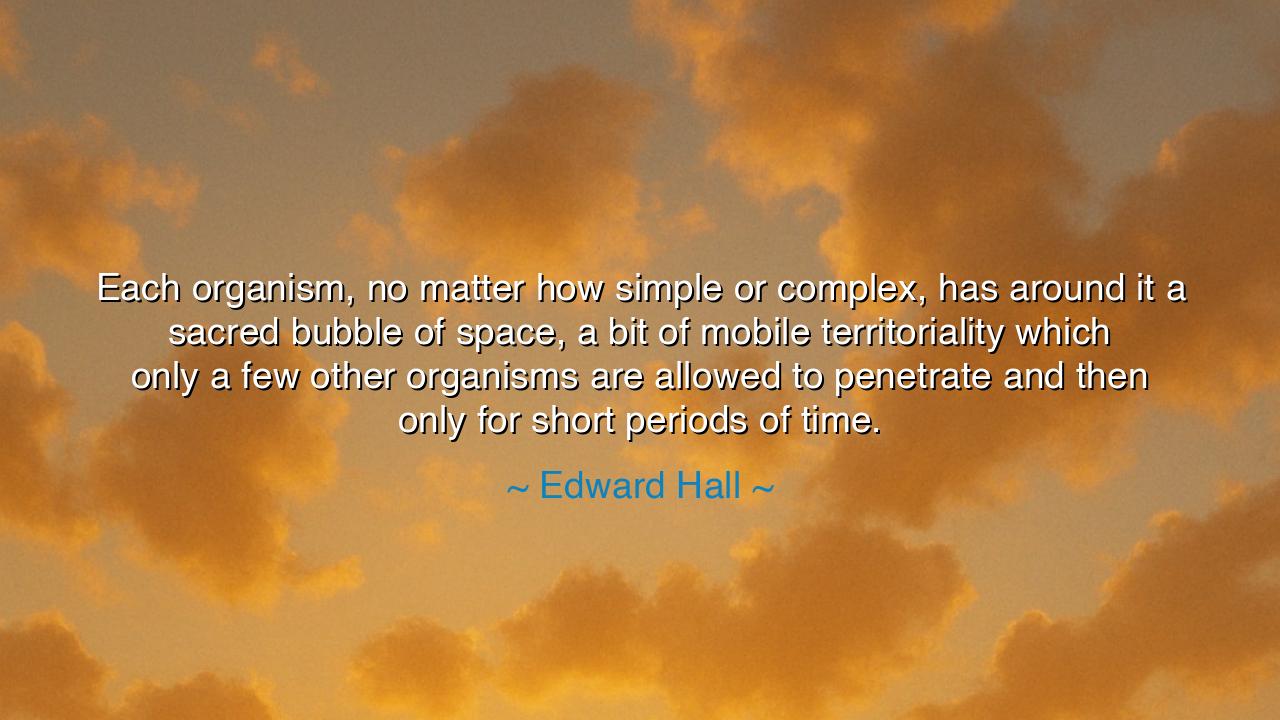
Each organism, no matter how simple or complex, has around it a
Each organism, no matter how simple or complex, has around it a sacred bubble of space, a bit of mobile territoriality which only a few other organisms are allowed to penetrate and then only for short periods of time.






Hear the words of Edward Hall, seeker of hidden patterns in human life, who revealed a truth both simple and profound: “Each organism, no matter how simple or complex, has around it a sacred bubble of space, a bit of mobile territoriality which only a few other organisms are allowed to penetrate and then only for short periods of time.” At first, these words seem as the observation of a scholar of behavior, but within them dwells an eternal teaching: that every being, from the humblest insect to the proudest king, guards an invisible boundary—a sacred bubble of space—the sanctuary of self.
This bubble is not seen with the eyes, yet it is felt with the soul. When another comes too close uninvited, the body stiffens, the spirit recoils. When one is granted entry with trust, the heart softens and opens. This unseen circle is the dwelling place of dignity. It is the space where freedom breathes, where individuality lives. To invade it without care is to trespass upon the temple of another’s being. To respect it is to honor the hidden law that binds all creatures.
Even in nature, we see this principle at work. The wolf growls when another nears its kill; the bird spreads its wings when its nest is approached. Among men, the same is true, though cloaked in subtler forms. In crowded markets, in city trains, in gatherings of nations, each guards their territory of presence—sometimes with silence, sometimes with gesture, sometimes with words. The wise learn that this need is not weakness, but the deep order of life itself.
History too testifies to the weight of this truth. Consider the moment when explorers first encountered new peoples in distant lands. When the Spanish pressed too closely into the dwellings of the Aztecs, when colonizers stood too near without regard for custom, it was not only weapons that caused conflict, but the violation of sacred space. Misunderstandings of proximity, of approach, of what was permitted, became sparks for mistrust and flames of war. Edward Hall, in his study of cultures, called this proxemics—the unspoken laws of distance that hold societies together.
And yet, there are times when this bubble of space is opened, when it is offered as a gift. The embrace of a mother with her child, the clasp of comrades in arms, the nearness of lovers who share breath—all these moments reveal that the most precious bonds are marked by permission to enter this sacred circle. Few are granted this privilege, and even then, only for a time. Thus, to be allowed within another’s invisible boundary is not to be taken lightly, but to be honored as a covenant of trust.
The lesson is clear: if you would walk wisely in the world, learn to respect the sacred bubble of others. Do not rush into intimacy uninvited. Do not disregard the boundaries of another soul. Approach gently, listen deeply, and wait until trust is extended. At the same time, know your own circle, and defend it without shame. For in this space you gather strength, you preserve dignity, and you nurture the self from which true connection flows.
Therefore, O children of wisdom, remember: every creature carries its own sanctuary of space. To respect it is to honor life itself. To enter it with reverence is to be entrusted with the most intimate gift. Let your steps in the world be mindful, neither crowding nor careless, but attuned to the invisible circles that surround us all. In this way, you will walk not as an intruder but as a companion, not as a violator but as one who honors the unseen law of existence.






AAdministratorAdministrator
Welcome, honored guests. Please leave a comment, we will respond soon